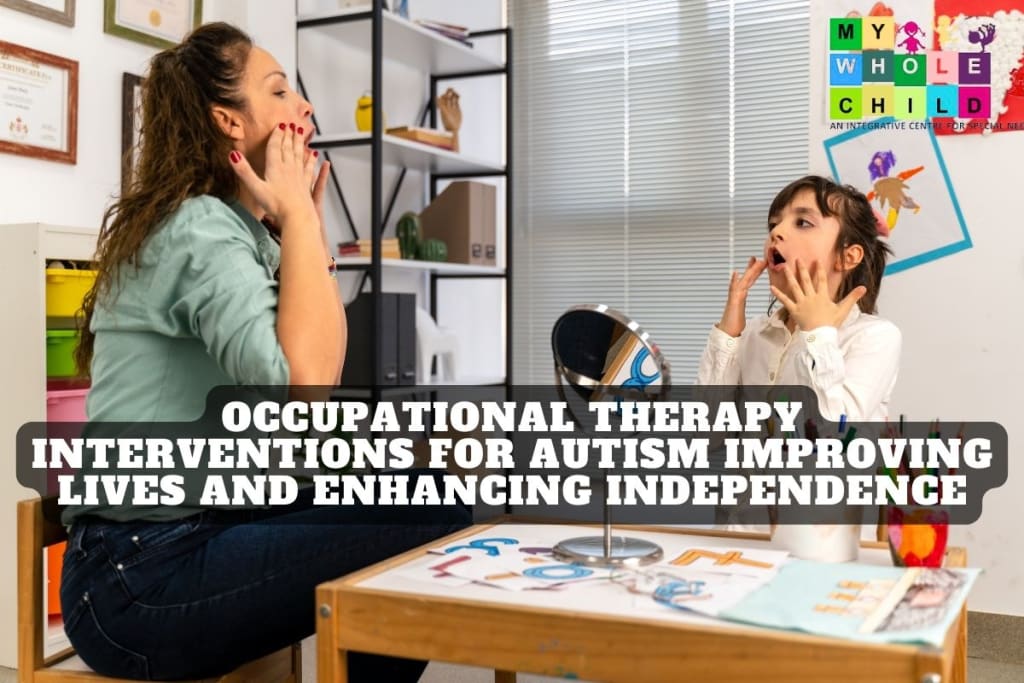Occupational Therapy Interventions for Autism: Improving Lives and Enhancing Independence
Occupational Therapy Interventions for Autism

Introduction
Millions of individuals across the globe find themselves impacted by a neurological ailment recognized as autism. This particular disorder has the potential to impede an individual's aptitude for communication, social interaction, and the processing of sensory stimuli. Occupational therapy provides beneficial interventions to assist people with autism in completing daily tasks, increasing their independence, and enhancing their general quality of life. This in-depth manual will examine the various occupational therapy methods for autism and how they can benefit those who are on the autistic spectrum.
Occupational Therapy Interventions for Autism: Explained
Occupational therapy (OT) interventions for autism encompass a wide range of strategies and techniques designed to address the unique challenges faced by individuals with autism. These interventions are tailored to the individual's specific needs and focus on improving their ability to participate in activities of daily living, develop essential skills, and overcome barriers to social engagement. Here, we will delve into some of the key occupational therapy interventions for autism.
Sensory Integration Therapy: Enhancing Sensory Processing Abilities
Sensory integration therapy is a cornerstone intervention for individuals with autism who struggle with sensory processing difficulties. This therapy aims to help individuals regulate their responses to sensory stimuli by providing structured activities that stimulate the senses. By engaging in sensory integration therapy, individuals with autism can develop better-coping mechanisms and reduce sensory sensitivities, leading to improved attention, self-regulation, and overall functioning.
Social Skills Training: Nurturing Meaningful Connections
Building and maintaining social connections can be challenging for individuals with autism. Social skills training is an integral component of occupational therapy interventions for autism, as it helps individuals develop effective communication, social interaction, and relationship-building skills. Through role-playing, group activities, and targeted interventions, occupational therapists facilitate the acquisition of essential social skills, such as turn-taking, initiating conversations, and interpreting non-verbal cues.
Cognitive-Behavioral Interventions: Promoting Cognitive Flexibility
Cognitive-behavioral interventions focus on enhancing cognitive flexibility and problem-solving abilities in individuals with autism. These interventions help individuals develop adaptive thinking patterns, manage anxiety, and navigate challenging situations more effectively. Occupational therapists employ various techniques, such as visual supports, social stories, and cognitive restructuring exercises, to promote cognitive flexibility and empower individuals with autism to overcome obstacles.
Visual Supports and Assistive Technology: Enhancing Communication and Independence
Individuals with autism often face difficulties with communication, both verbal and non-verbal. Occupational therapists utilize visual supports and assistive technology to improve communication skills and foster greater independence. Visual supports, such as visual schedules and communication boards, provide individuals with a visual framework to understand and follow routines. Assistive technology, such as speech-generating devices and augmented communication apps, can empower individuals with autism to express their thoughts, needs, and desires more effectively.
Applied Behavior Analysis (ABA) Therapy: Shaping Behavior and Skills
Applied Behavior Analysis (ABA) therapy is a widely recognized intervention for individuals with autism. This evidence-based approach focuses on systematically shaping behavior and teaching new skills through positive reinforcement. Occupational therapists may collaborate with ABA professionals to provide holistic support and incorporate ABA principles into their interventions, promoting skill acquisition, behavior management, and overall progress.
Adaptive Equipment and Environmental Modifications: Creating Supportive Environments
Occupational therapists often recommend adaptive equipment and environmental modifications to create supportive environments for individuals with autism. These accommodations can include specialized seating, sensory tools, visual cues, and organization systems. By tailoring the environment to meet specific sensory, motor, and cognitive needs, individuals with autism can thrive and engage more effectively in their daily activities.
Executive Functioning Training: Enhancing Planning and Organization Skills
Executive functioning refers to a set of cognitive processes responsible for planning, organization, problem-solving, and self-regulation. Occupational therapists provide executive functioning training to individuals with autism, helping them develop these essential skills. Through strategies such as task analysis, time management techniques, and goal-setting exercises, individuals can improve their planning, organization, and overall executive functioning abilities.
Self-Care and Activities of Daily Living (ADL) Training: Promoting Independence
Occupational therapy interventions for autism often focus on enhancing self-care skills and activities of daily living (ADL). These skills include dressing, grooming, feeding, and hygiene routines. Occupational therapists work with individuals to develop the necessary motor skills, sensory integration abilities, and cognitive strategies to perform these tasks independently, promoting self-confidence, autonomy, and overall well-being.
Parent and Caregiver Education and Support: Empowering Families
Occupational therapy interventions for autism extend beyond direct work with the individual. Therapists also provide education and support to parents and caregivers, empowering them to support their loved ones with autism. By offering strategies, resources, and guidance, occupational therapists enable families to create a nurturing and inclusive environment that fosters growth, development, and progress.
School-Based Occupational Therapy: Enhancing Academic Engagement
Occupational therapists play a vital role in school settings, collaborating with educators and students to enhance academic engagement for individuals with autism. They focus on promoting sensory regulation, fine motor skills, attention, and executive functioning abilities to support the student's educational success. Through targeted interventions and classroom modifications, occupational therapists contribute to creating an inclusive learning environment for students with autism.
Community Integration and Social Participation: Encouraging Inclusion
Community integration and social participation interventions aim to support individuals with autism in engaging meaningfully with their communities. Occupational therapists collaborate with individuals, families, and community organizations to identify opportunities for participation, develop social skills, and address potential barriers. By fostering inclusion and facilitating social connections, individuals with autism can develop a sense of belonging and improve their overall quality of life.
FAQ
Q. What is the role of occupational therapy in treating autism?
A. Occupational therapy plays a crucial role in treating autism by providing interventions and strategies to improve individuals' participation in daily activities, enhance social skills, address sensory processing difficulties, and promote independence.
Q. How can sensory integration therapy benefit individuals with autism?
A. Sensory integration therapy can benefit individuals with autism by helping them regulate their responses to sensory stimuli, reduce sensory sensitivities, and improve attention, self-regulation, and overall functioning.
Q. What are some common occupational therapy techniques for promoting social skills in individuals with autism?
A. Occupational therapists utilize various techniques for promoting social skills in individuals with autism, such as role-playing, group activities, and targeted interventions focusing on turn-taking, initiating conversations, and interpreting non-verbal cues.
Q. Can occupational therapy help individuals with autism improve their communication skills?
A. Yes, occupational therapy can help individuals with autism improve their apologies for the confusion. Here are additional subheadings related to the keyword "Occupational therapy interventions for autism":
Conclusion
Occupational therapy interventions for autism offer a holistic and individualized approach to support individuals on the autism spectrum. Through various techniques, such as sensory integration therapy, social skills training, and cognitive-behavioral interventions, occupational therapists help individuals enhance their independence, overcome challenges, and thrive in daily life. By addressing the unique needs of each individual, occupational therapy plays a crucial role in improving the lives of those with autism and promoting their overall well-being.
About the Creator
MyWhole Child
If you looking for best special education centre in Delhi, MyWholeChild is perfect place for you. This Centre has been developed under the guidance of paediatric faculty from the USA and India to provide a platform to maximize






Comments
There are no comments for this story
Be the first to respond and start the conversation.